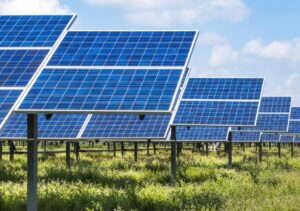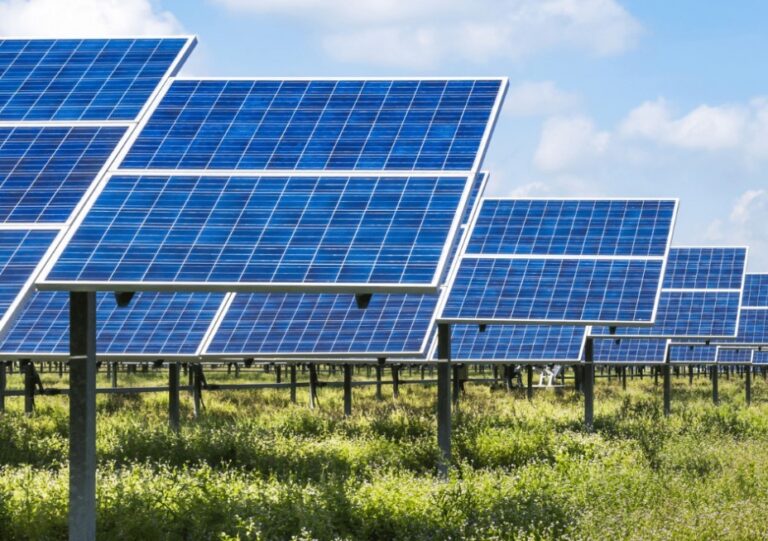
Derbyshire County Council has given the go-ahead for £700,000 of Government funding towards plans for a clean energy facility on ‘farmland’ just days after agreeing to oppose solar farms and battery energy storage schemes on greenfield sites.
The Reform UK-led council approved the Mayoral Renewables Fund grant money at a Cabinet meeting on October 16 for the solar farm at the former Williamthorpe Colliery site, off Mansfield Road, at Temple Normanton, Chesterfield, with the funding to be delivered via the Labour-controlled East Midlands Combined County Authority and the Department for Energy Security and Net Zero.
Cllr Carol Wood, Cabinet Member for Net Zero and the Environment, told the meeting: “This was a scheme on the old Williamthorpe Colliery site – a brownfield tip site.
“It was approved before this administration and planning permission was obtained and £700,000 of EMCCA funding was offered.”
The former Conservative-controlled county council secured planning permission for the scheme as the original applicant by December, 2024, and it agreed to capital funding for the solar farm and it pursued the Mayoral Renewables Fund Government grant funding via EMCCA from February, 2025, and the development has since been scaled back to maximise the value of the grant and to simplify the project.
A Derbyshire County Council report states that the site consists of ‘farmland’ on an area that once formed part of the former Williamthorpe Colliery site and it is currently used for grazing.
During a public consultation some had objected to the original planning application with concerns that it would result in the loss of fertile farmland, affect wildlife, create an eyesore and that brownfield sites should be used for such schemes.
But the council’s newly-installed Reform UK Cabinet approved the latest £700,000 of funding on October 16 just eight days after the council voted by a majority at a Full Council meeting on October 8 to oppose the development of large scale solar panel farms and battery energy storage systems (BESSs) on greenfield sites and particularly farmland across the county in what it stated is a bid to protect the area’s countryside and food security.
The council stated in its latest report, which was considered on October 16, that proceeding under the grant terms ensures alignment with national priorities and timelines set by DESNZ, while also demonstrating the council’s commitment to strategic objectives such as sustainability, transformation, and asset improvement.
However, Council Leader Alan Graves has expressed particular concerns for four planning applications currently being considered by South Derbyshire District Council mainly on agricultural land including Oaklands Farm Solar Park, between Rosliston and Walton-on-Trent, a Stenson Lane BESS, near Stenson, and an Eggington BESS and a solar and BESS scheme at Arleston Manor Farm, near Derby.
Cllr Graves also highlighted an approved scheme at Park Road, Overseal, Swadlincote, for a battery energy storage system facility.
He argued such developments have implications for the wider county, including visual impact, traffic movements, land use change, and community cohesion.
Cllr Graves told the October 8 Full Council meeting the county council is under attack from Net Zero schemes and that battery energy storage systems on farmland disrupt wildlife corridors and threaten future food security with the loss of agricultural land.
He also stated the materials used for such schemes were being made in China and would have to be shipped halfway around the world to Derbyshire.
Cllr Graves stated: “The Government obsession with Net Zero should never be delivered in a way that disrespects local communities, negatively impacts productive farmland, and over industrialises the countryside.”
This council’s decision to oppose such schemes on greenfield sites in the future comes in spite of claims that solar farms and battery energy storage sites serve to meet Net Zero targets by reducing greenhouse gas emissions and that they increase energy security and will support economic growth.
However, the authority’s concerns lie with food security and with the loss of agricultural land but it has stated it will support the development of energy security, energy efficiency and clean energy.
Council officers advised the authority to approve the latest funding to enable the council to secure external funding to support delivery of the project, reduce reliance on internal borrowing and to mitigate financial risk.
They also outlined this would mean the council would be adhering to the grant terms that ensure alignment with national priorities and timelines set by the DESNZ while demonstrating the council’s commitment to strategic objectives such as sustainability, transformation, and asset improvement.
Officers also felt this decision will reduce financial pressure and support the timely delivery of the project in line with DESNZ deadlines while aligning with strategic goals and enhancing the council’s reputation for securing and delivering funded programmes.
Environment campaigners recently held a demonstration at the council’s County Hall headquarters on October 8 against the Reform-UK-led authority’s decision to scrap its Climate Change committee and its on-going policy to deprioritise Net Zero carbon reductions.
But the council has argued its decision to oppose solar farms and BESS schemes on greenfield sites will protect the area’s countryside, wildlife and agricultural food security while preventing a ‘Chinese manufactured eco-desert’ with imported materials for the schemes.
Cllr Graves, has also claimed that money generated in the green transition comes mainly from taxpayers and it is costing people money and the council’s decision not to pursue efforts to tackle the causes and impact of Climate Change was made due to the cost of Net Zero.
EMCCA has stated the £700,000 of funding will be used to develop a 2MW solar farm on reclaimed land that was part of the Williamthorpe Colliery and the installation of the project is due to be completed in Spring 2026.
The site will generate around 1.9 million kWh per year, according to EMCCA, which is enough energy to power over 700 homes annually, based on average UK households.
It added that the energy generated on the solar farm will be exported to the grid and will reduce Derbyshire County Council’s energy bills by more than £100,000 per year. and over the project lifetime, it is expected to save the council more than £3m.
EMCCA says renewable energy generation is also a key part of its approach to tackling climate change, and the projects will see the region’s carbon footprint reduced by an estimated 8,550 tonnes of CO2 over 30 years.
EMCCA Mayor Claire Ward said: “I’m spearheading a green industrial revolution here in the East Midlands to protect future generations from the impacts of the climate crisis.
“Last year, we said farewell to the use of coal in our region, and we’re now transitioning to become a clean energy powerhouse, with solar being an important part of the energy mix.
“Our approach to tackling the climate crisis presents a huge opportunity for our communities. We’re creating a region that is more resilient and sustainable, which will support everyone who lives in the region to thrive.
“As Mayor, I’m putting national Net Zero policy into practice on a local level by securing this funding – and this is just the start of our productive relationship with Great British Energy.”
The council’s Cabinet approved the latest £700,000 of funding for the proposed Williamthorpe Clean Energy Facility and it agreed that authority be delegated to the council’s Executive Director for Corporate Services and Transformation to confirm acceptance of the grant terms.
Opposition Conservative Group Leader, Cllr Alex Dale, has expressed concerns that even though solar farms and BESS schemes are supposed to be using low-quality agricultural land this kind of land can still be an important part of the food chain and he has backed the Reform UK authority’s stance to protect farmland.
Green Party Group Leader, Cllr Gez Kinsella, has opposed Cllr Graves’ position to oppose solar farms and BESS schemes on greenfield sites which he described as ‘problematic’ after he claimed the Council for the Preservation of Rural England and the National Farm Union are eager to protect high-grade farmland from solar farms but they are less concerned about the use of low-grade farmland.
The Labour Government supports the expansion of solar power in its bid to achieve clean energy by 2030 and it also supports battery energy storage schemes which store excess electricity from renewable sources for later use as part of efforts to establish a decarbonised electricity grid and energy security.
It argues that such schemes support Net Zero targets by reducing greenhouse gas emissions and that they increase energy security and will support economic growth.






